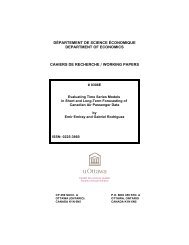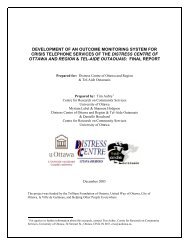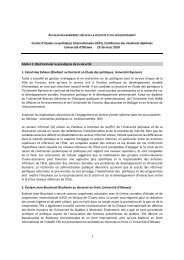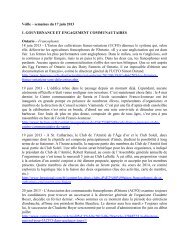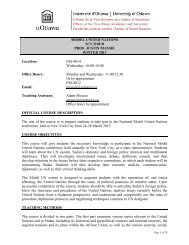Full text - Faculty of Social Sciences - Université d'Ottawa
Full text - Faculty of Social Sciences - Université d'Ottawa
Full text - Faculty of Social Sciences - Université d'Ottawa
You also want an ePaper? Increase the reach of your titles
YUMPU automatically turns print PDFs into web optimized ePapers that Google loves.
84 IPC Review 3 Lessons for Canadian Crime Prevention: Cultural Shifts and Local Flexibilities 85<br />
The slippery concept <strong>of</strong> evidence-based policy has also been shown, argues<br />
Homel, to be much more complex than its initial proponents suggested, since<br />
it entails agreements on the nature <strong>of</strong> evidence, and strategic ways <strong>of</strong> creating<br />
and measuring it. In the CRP, there was too great an emphasis on formal<br />
research evidence, rather than on other types <strong>of</strong> evidence about how programs<br />
worked, and what their outcomes were. He makes a useful distinction between<br />
performance measurement and evaluation as two valuable aides to informing<br />
crime prevention policy and practice: the former assists with the day-to-day<br />
management <strong>of</strong> programs, while the latter informs overall decisions about<br />
programs and policies.<br />
There are a number <strong>of</strong> strategic lessons from these experiences that are<br />
important for Canada. For example:<br />
• A strong deterrent justice system is not sufficient to prevent crime – an<br />
effective and well-funded justice system does not guarantee reductions in<br />
crime or increased community safety and quality <strong>of</strong> life. The economy,<br />
social and environmental conditions and other factors are also important<br />
and likely to impact crime levels, and responding to those will save justice<br />
and social costs. The experience <strong>of</strong> South Africa provides a stark example<br />
<strong>of</strong> a country living under extreme security conditions, and with tough and<br />
deterrent criminal justice, which has so far failed to impact the levels <strong>of</strong><br />
serious violent crime over the past twelve years. The recently launched<br />
Action for a Safe South Africa 2 argues that the justice system would collapse<br />
if all crimes were dealt with, and a broader preventive approach is seen as the<br />
only solution.<br />
• The dangers <strong>of</strong> target-setting and managerial approaches are well<br />
demonstrated. They can be counterproductive, and reduce flexibility and<br />
pr<strong>of</strong>essional judgment.<br />
• Too much focus on crime can contribute to increasing anxieties and<br />
expectation <strong>of</strong> the government’s role and capacity to intervene – crime in<br />
England and Wales is down, but levels <strong>of</strong> fear remain high.<br />
• The focus <strong>of</strong> crime prevention policies should be on creating safe communities<br />
rather than reducing or deterring crime. This requires long-term funding,<br />
not just pilot or demonstration projects.<br />
2 See www.safesouthafrica.org.za<br />
• “Imposing civility by coercion”, as in the case <strong>of</strong> Anti-<strong>Social</strong> Behaviour<br />
Orders in England and Wales, is a mistake which has been costly in<br />
terms <strong>of</strong> increased justice interventions, as well as going against principles<br />
<strong>of</strong> inclusion. The City <strong>of</strong> Bogota, by contrast, has clearly demonstrated<br />
how a culture <strong>of</strong> civility can be created through the use <strong>of</strong> innovative and<br />
participatory approaches, including clowns. The use <strong>of</strong> social mediators in<br />
public spaces in France <strong>of</strong>fers another example. International standards are<br />
being increasingly applied in many countries. The UN Guidelines for the<br />
Prevention <strong>of</strong> Crime (2002) stress the importance <strong>of</strong> the inclusion <strong>of</strong> young<br />
people, especially those most likely to be involved in the justice system, not<br />
their demonization.<br />
• Governments can learn from the experience <strong>of</strong> other countries. While policy<br />
does not always travel well, and it is important to look at and adapt programs<br />
to local con<strong>text</strong>s and circumstances, some good lessons about process,<br />
implementation, and evaluation have been learnt from recent experiences.<br />
• Other countries and regions with rather different experiences from developed<br />
countries, such as South Africa, Brazil, Columbia, Mexico, Trinidad &<br />
Tobago or Chile can provide some valuable lessons about good practices.<br />
• It is important to innovate, and to set realistic expectations about the likely<br />
impacts <strong>of</strong> interventions. As Homel points out, research evidence is just<br />
one source <strong>of</strong> knowledge; the messiness <strong>of</strong> actual project implementation,<br />
the knowledge and energies <strong>of</strong> practitioners, and the timelines <strong>of</strong> policy<br />
makers also affect outcomes and impacts. There should still be room for<br />
innovation, not just replication <strong>of</strong> proven “examples”.<br />
• The growing importance <strong>of</strong> modern “tools” for data collection and<br />
analysis, such as observatories <strong>of</strong> crime and social problems, and the use <strong>of</strong><br />
local community safety audits to support local and regional multi-sector<br />
partnerships and coordinating bodies.<br />
• Crime happens locally – the importance <strong>of</strong> the principle <strong>of</strong> subsidiarity – <strong>of</strong><br />
the devolution <strong>of</strong> both powers and resources to local levels. This has been<br />
very effectively demonstrated in Colombian and Brazilian cities, but with<br />
strong central government support – financial, technical, and normative.<br />
Much <strong>of</strong> the experience distilled in these articles, and ICPC’s (2008)<br />
International Report, points to the learning curve <strong>of</strong> governments trying<br />
to work in very different ways from the past, after centuries <strong>of</strong> national




